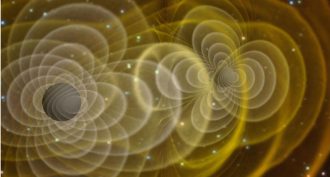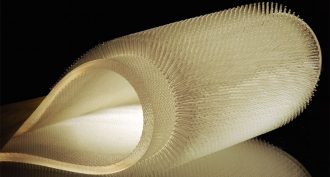Physics

Educators and Parents, Sign Up for The Cheat Sheet
Weekly updates to help you use Science News Explores in the learning environment
Thank you for signing up!
There was a problem signing you up.
-
 Health & Medicine
Health & MedicineFlexible electronics track sweat
A flexible, wireless health monitor that can wrap around the wrist tracks temperature and analyzes sweat to detect signs of too much water loss.
By Meghan Rosen -
 Physics
PhysicsGravity waves detected at last!
Albert Einstein predicted gravitational waves 100 years ago. Now scientists have detected them coming from the collision of two black holes.
By Andrew Grant -
 Physics
PhysicsExplainer: What are gravitational waves?
Albert Einstein had predicted that large catastrophes, like colliding black holes, should produce tiny ripples in the fabric of space. In 2016, scientists reported finally detecting them
By Christopher Crockett and Andrew Grant -
 Physics
PhysicsHow to catch a gravity wave
Physicists have just announced finding gravity waves. The phenomenon was predicted a century ago by Einstein’s theory of general relativity. Here’s what it took to detect the waves.
-
 Earth
EarthBright night lights, big science
When the northern lights flare, blame the sun. Scientists say auroras “surge” when energy from solar wind builds up on the night side of the Earth.
-
 Physics
PhysicsTracking warfare by ‘Earth shakes’
Geophysicists are discovering how weapons shake, rattle, and roll the Earth. What they’re learning might one day help win wars.
By Beth Geiger -
 Chemistry
ChemistryNew bendy device could power wearable electronics
A new device with lithium and silicon electrodes uses chemistry to generate electricity as it bends back and forth.
-
 Materials Science
Materials ScienceWet suits with hair?
The dense hair that keeps sea otters warm in frigid waters may inspire development of “furry” wet suits for scuba divers.
By Sid Perkins -
 Physics
PhysicsNews Brief: Why rainbows can lose some hues
When the sun is right near the horizon, such as at sunset, its light travels through the most atmosphere. When there’s also plenty of water in the air, this can rob colors from a rainbow, scientists now report.
-
 Physics
PhysicsZombie stars: A source of gravitational waves?
Scientists have found indirect evidence that the dense cores of dead stars are making ripples in space, known as gravitational waves. These waves have been predicted but never yet directly “seen.”
By Andrew Grant -
 Animals
AnimalsSome fish wear an invisibility cloak
Some fish can hide in open water. How? Tiny crystals in their scales and skin help them reflect and blend in with polarized light.
By Ilima Loomis -
 Tech
TechEngineers consider liquid salt to generate power
A new type of power plant, a molten salt reactor, might provide electricity in a cleaner and safer way than current nuclear technology.